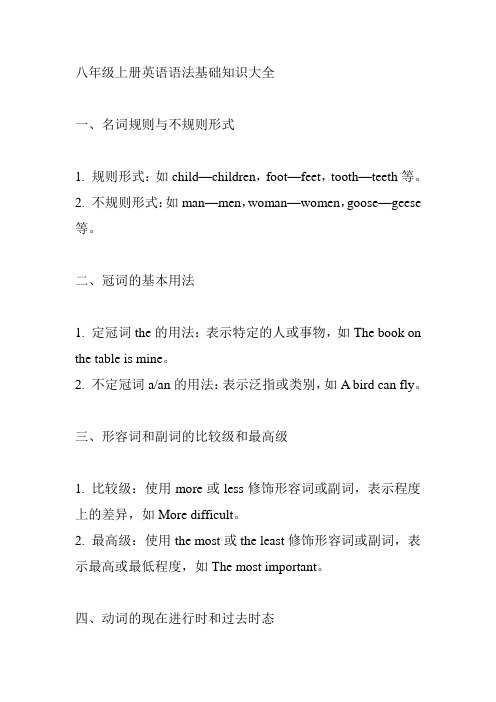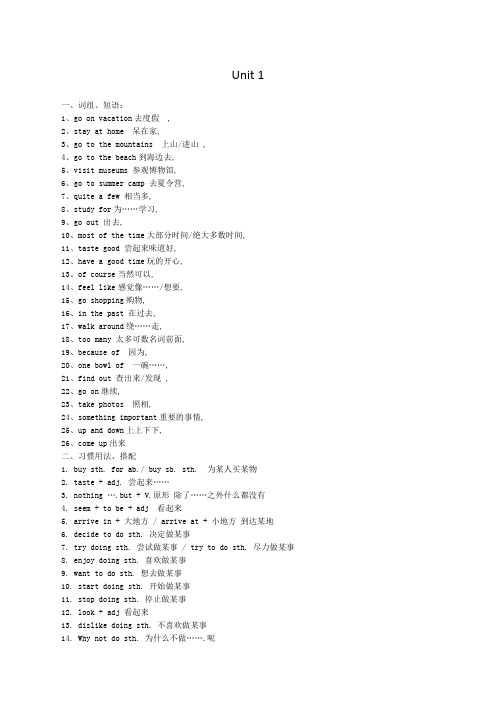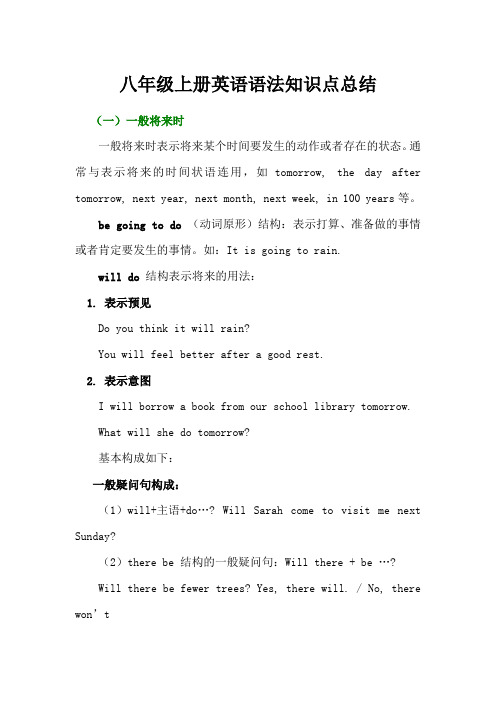八年级上英语语法点(完整版)
人教版八年级上册英语语法、短语和知识点总结归纳

人教版八年级上册英语语法、短语和知识点总结归纳一、语法1. 一般现在时- 用法:表示经常性或惯性的动作或状态。
- 结构:主语 + 动词原形 (+ 其他成分)- 示例:I play soccer every weekend.2. 一般过去时- 用法:表示过去某个时间点或一段时间内发生的动作或存在的状态。
- 结构:主语 + 动词过去式 (+ 其他成分)- 示例:She watched a movie last night.3. 现在进行时- 用法:表示现在正在发生的动作。
- 结构:主语 + am/is/are + 动词-ing (+ 其他成分)- 示例:They are studying for the exam.4. 现在完成时- 用法:表示动作或状态发生在过去某个时间点,但与现在有关。
- 结构:主语 + have/has + 动词过去分词 (+ 其他成分)- 示例:I have finished my homework.5. 情态动词- 用法:表示能力、意愿、可能性等。
- 常见的情态动词有 can, could, may, might, must, should, ought to 等。
- 示例:He should go to bed early.二、短语1. as well as- 用法:表示两个事物同时存在或发生。
- 示例:She can speak English as well as Chinese.2. in order to- 用法:为了做某事。
- 示例:They woke up early in order to catch the train.3. by the way- 用法:用于引入一个新的话题或问题。
- 示例:By the way, have you seen the latest movie?三、知识点1. 直接引语和间接引语- 直接引语:用引号括起来的原话。
- 间接引语:将直接引语转述为陈述句或疑问句。
八年级上册英语语法基础知识大全

八年级上册英语语法基础知识大全一、名词规则与不规则形式1. 规则形式:如child—children,foot—feet,tooth—teeth等。
2. 不规则形式:如man—men,woman—women,goose—geese 等。
二、冠词的基本用法1. 定冠词the的用法:表示特定的人或事物,如The book on the table is mine。
2. 不定冠词a/an的用法:表示泛指或类别,如A bird can fly。
三、形容词和副词的比较级和最高级1. 比较级:使用more或less修饰形容词或副词,表示程度上的差异,如More difficult。
2. 最高级:使用the most或the least修饰形容词或副词,表示最高或最低程度,如The most important。
四、动词的现在进行时和过去时态1. 现在进行时态:表示正在进行的动作或状态,结构为be + -ing形式,如I am studying。
2. 过去时态:表示过去的动作或状态,结构为动词的过去式,如I studied。
五、被动语态的使用1. 被动语态表示主语是动作的接受者,常用by引导的行为主体,如She was seen by him。
2. 被动语态的构成:be + 过去分词,如The book was written by him。
六、条件状语从句和时间状语从句1. 条件状语从句:表示假设条件,常用if或unless引导,如If you study hard, you will succeed。
2. 时间状语从句:表示时间上的先后关系,常用when、while、as等引导,如When he comes, I will tell him the news。
七、并列句和复合句的结构1. 并列句:由并列连词and、or等连接的句子,结构相对简单,如I like apples and she likes bananas。
八年级英语上册第一单元语法知识点归纳

Unit 1一、词组、短语:1、go on vacation去度假 ,2、stay at home 呆在家,3、go to the mountains 上山/进山 ,4、go to the beach到海边去,5、visit museums 参观博物馆,6、go to summer camp 去夏令营,7、quite a few 相当多,8、study for为……学习,9、go out 出去,10、most of the time大部分时间/绝大多数时间,11、taste good 尝起来味道好,12、have a good time玩的开心,13、of course当然可以,14、feel like感觉像……/想要,15、go shopping购物,16、in the past 在过去,17、walk around绕……走,18、too many 太多可数名词前面,19、because of 因为,20、one bowl of 一碗……,21、find out 查出来/发现 ,22、go on继续,23、take photos 照相,24、something important重要的事情,25、up and down上上下下,26、come up出来二、习惯用法、搭配1. buy sth. for ab./ buy sb. sth. 为某人买某物2. taste + adj. 尝起来……3. nothing ….but + V.原形除了……之外什么都没有4. seem + to be + adj 看起来5. arrive in + 大地方 / arrive at + 小地方到达某地6. decide to do sth. 决定做某事7. try doing sth. 尝试做某事 / try to do sth. 尽力做某事8. enjoy doing sth. 喜欢做某事9. want to do sth. 想去做某事10. start doing sth. 开始做某事11. stop doing sth. 停止做某事12. look + adj 看起来13. dislike doing sth. 不喜欢做某事14. Why not do sth. 为什么不做…….呢15. so + adj + that + 从句如此……以至于……16. tell sb. not to do sth. 告诉某人不要做某事17. keep doing sth. 继续做某事18. forget to do sth. 忘记去做某事 / forget doing sth 忘记做过某事三、重点句子1. Where did you go on vacation 你去哪儿度假的1这是一个由疑问副词where引导的特殊疑问句;Where用来询问地点或场所,用于句首,其后跟一般疑问句;如:Where are you from Where does he live2go on vacation“去度假”He will go on vacation with his family. 他要和家人一起度假;解析 vacation v'ken n 假期 = holidayon vacation 在度假 take a vacation 去度假 winter vacation 寒假 summer vacation 暑假①I have a lot of _______________every year . vacation②— Where did Sarah go on vacation— She went to America.A.on vacationB. take a vacationC. is on vacationD. is for vacation2、Did you go with anyone你和别人一起去的吗这是一个一般过去时的一般疑问句;当含有实义动词的一般过去时的陈述句变为一般疑问句时,需借助助动词did,此时后面的实义动词应用原形;其句型结构为“did+主语+动词原形+其它”,肯定回答为“Yes,主语+did”,否定回答为“No,主语+didn′t”·基本用法pron. anyone 任何人,相当于anybody,通常用在否定句、疑问句或条件从句中;如: I wont tell anyone I saw you here. 我不会告诉任何人我在这儿见过你;Why would anyone want that job 为什么会有人想要那份工作呢知识拓展---同类词Some - any- no- every-指人 someone 有人 anyone 任何人 anybody no one 没有人nobody everyone 人人 everybody指物 something 某物 anything 任何事 nothing 没有事everything 一切事指地点 somewhere 某地 anywhere 任何地方 nowhere 无处,没有地方 everywhere 到处注意:1由some-, any-, no-, every-构成的符合不定代词作主语时,都作单数看待,其谓语动词用第三人称单数形式;2不定代词若有定语修饰,该定语要置于其后,作后置定语;如:Id like something to drink. 我想要些喝的;Is there anything interesting in the book 这本书中有有趣的东西吗小结:解析1someone smwn pron 某人anyone eniwn pron 任何人 everyone evriwn pron 每人,人人 my uncle 看望了我的叔叔visit是及物动词,意为“拜访;探望”,后接表示人的名词或代词; visit还可以意为“参观;游览”,后接表示地点的名词;a.I visited my grandmother last week. 上周我去______了我的外婆;b. you want to visit Shanghai 你想______上海吗c.拓展:visitor意为“参观者;游客”;These visitors come fromanything special 买特别的东西;P21buy及物动词,意为“买;购买”;其过去式为______;拓展:buy sth. for sb.=buy sb. sth. 意为“给某人买某物”; My uncle_____ _____a bike.= My uncle_____ _____for me.2)anything不定代词,意为“某事;某件东西”,主要用于疑问句或否定句中;a.Do you want to buy anything for me cant say anything about it.3)anthing special表示“特别的东西”,形容词修饰不定代词时后置;Is there________ ________in this book这本书里有新的内容吗, did you go anywhere interesting哦,你去有趣的地方了吗P21本句是did开头的一般疑问句2anywhere用作副词,意为“在任何地方”;eg:Did you go anywhere during the summer vacation 辨析:anywhere与somewhereanywhere意为“在任何地方”,常用于否定句和疑问句中; eg:I cant find it anywhere.somewhere意为“在某处;到某处”,常用于肯定句中; eg:I lost my key somewhere near here. took quite a few photos there.我们在那里拍了不少照片;P2take photos 意为“照相;拍照”; eg:We______ ______on the Great Wall.我们在长城上照了相;辨析:quite a few与quite a littlequite a few 意为“很多;不少”,修饰可数名词复数;quite a little 意为“很多;不少”,修饰不可数名词;a. He stays here for _____ _____ _____days.is _____ _____ _____water in the bottle瓶子.6. I just stayed at home most of the time to read and relax. 我大部分时间只是待在家里读书休息; P2most of the time意为“大部分时间”,其中most为代词,意为“大部分;大多数”拓展most of…意为“……中的大多数”,它作主语时,谓语动词取决于most of后所修饰的名词;of us_____begoing to the park. 我们大多数人要去公园;b. Most of the food_____gobad. 大部分的食物都变质了;7.Everything tasted really good所有的东西尝起来真的很好吃P3taste在此为系动词,意为“尝起来”,其后接形容词构成系表结构;a.The food tastes really great.食物尝起来棒极了;8. Did everyone have a good time大家都玩得很开心吗P3have a good time = enjoy oneself = have fun 玩得开心 + doingeg: We had a good time visiting the the Great Wall. = We enjoyed ourselves visiting the the Great Wall.= We had fun visiting the the Great Wall.did you like it 你觉得它怎么样P3How do/did you like……意为“你觉得……怎么样”,用来询问对方的观点或看法,相当What do you think of……eg: How do you like your new job = _____ _____ _____ _____ your new jobyou go shopping 你们去购物了吗P3go shopping意为“去购物;去买东西”,同义短语为do some shopping.eg: I usually go shopping on Sundays.我通常星期天去购物;拓展:“go+doing”形式表示“去做某事”,常用于表达从事某一体育活动或休闲活动;go skating 去滑冰go hiking 去远足 go sightseeing 去观光 go fishing 去钓鱼 go swimming 去游泳go boating 去划船went to a friends farm in the countryside with my family.我和家人一起去了乡下一个朋友的农场;P3a friend’s farm是名词所有格形式;一般情况下,表示“有生命的人或物”的名词后面加s,表示所属关系;eg:The red bike is Alices. 那辆红色的自行车是爱丽斯的;拓展:名词所有格的构成:1单数名词词尾加s ,复数名词词尾没有s,也要加sthe girl ‘s pen女孩的钢笔 women’s shoes女鞋 on Children’s Day2复数名词以s结尾的只加the students’ reading room学生阅览室 Teachers’ Day教师节3如果两个名词并列,并且分别有s,则表示“分别有”;只后一个名词有一个s,则表示“共有”:John’s and Kate’s rooms. 约翰和凯特各自的房间; Lily and Lucy’s father. 莉莉和露西的爸爸同一个爸爸; 4表示无生命的名词一般以...of...构成短语,表示所有关系;a map of China一幅中国地图 the name of the story那个故事的名字12.Still no one seemed to be bored. 即使这样仍然没有人看起来无聊;P31seem意为“好像;似乎;看来”;eg:Everything seems easy.一切似乎很容易;拓展 a. seem+adj. “看起来……”; You seem happy today.你今天看起来很高兴;b. seem+to do sth. “似乎,好像做某事”; I seem to have a cold.我似乎感冒了;=It seems that I have a cold.c. It seems/seemed+从句“看起来好像…;似乎…”;It seems that no one believes you.看起来好像没有人相信2辨析:bored与boringa. bored意为“厌烦的;感到无聊的”,一般在句中修饰人;b. boring意为“无聊的;令人厌烦的”,一般在句中修饰事或物;eg:a. I’m ______with what he said.我对他说的话厌烦极了;b. I find the story very_______.我发现这个故事太无聊了;二Section B1. What activities do you find enjoyable 你发现什么活动让人快乐P5enjoyable形容词,意为“愉快的;快乐的”;Im sure we will have an enjoyable vacation. 我确信我们将会有一个愉快的假期;2. I arrived in Penang in Malaysia this morning with my family. 今天早上我和家人到达了马来西亚的槟城;P5arrive不及物动词,意为“到达”;arrive in表示到达较大的地方,如国家、省、市等;arrive at表示到达较小的地方,如机场、商店、广场、村庄等;注:地点副词home,here,there前介词省略辨析:①arrive in+大地点 / arrive at+小地点②get to +地点③reach+地点eg:I 到达 school at 8:00 oclock yesterday.3. …so we decided to go to the beach near our hotel…因此我们决定到旅馆附近的海滩上去;P5 decide to do sth.意为“决定做某事”; eg: They _____ ______ ______the museum.他们决定去参观博物馆;拓展:decide后常跟“疑问词+动词不定式”做宾语;He can’t decide when ______ _____leave 他不能决定何时动身;4. My sister and I tried paragliding.姐姐和我尝试了滑翔伞运动;P5try此处用作及物动词,其后常接名词、动名词或不定式,意为“尝试;试图,设法;努力”She is trying my bicycle.她正在试骑我的自行车;拓展:try也可用作名词,意为“尝试”,常用短语“have a try”,意为“试一试”;I want to have a try.我想试一试;辨析:try doing sth. / try to do sth.1try doing sth. 尝试做某事,表示一种尝试、做做看的想法,不一定付出很多努力;2try to do sth.尽力、设法去做某事,表示想尽一切办法要把事情办成,强调付出努力设法去完成;a. I ______ ______ him, but no one answered. 我试着给他打电话了,但没有人接听;b. Im ______ ______ ______ English well. 我正尽力把英语学好;5. I felt like I was a bird. It was so exciting 我感觉自己就像一只小鸟;太刺激了P51feel like意为“给……的感觉;感受到”;其后常接从句; eg: He feels like he is swimming. 他感觉像在游泳一样;拓展:feel like还可意为“想要……”,其后可接名词、代词或动名词;即: feel like sth. 想要某物 feel like doing sth. 想要做某事 eg:Do you feel like a cup of tea now 你现在想要一杯茶吗Do you feel like ______ take a walk in the park with me 你想跟我在公园散步吗2辨析:exciting与excitedexciting 意为“令人兴奋的,使人激动的”, 一般修饰某物; excited 意为“感到兴奋的,激动的”, 一般修饰某人; Eg: story is_________exciting, excited .told me the_______exciting, excitednews.was_______exciting, excitedto see the singer.6.There are a lot of new buildings now…现在有许多新的建筑物……P5building 可数名词,意为“建筑物;楼房”;build 动词,“建造,建筑” built,built,The workers built many tall buildings in our school last year.7. I wonder what life was like here in the past. 我想知道在这儿过去的生活是什么样的;P5 wonder此处是及物动词,意为“想知道;琢磨”;其后常接who, what, why等疑问词引导的宾语从句;Eg: wonder _______________. 我想知道那个男孩是谁;A. the boy is who B. who the boy is 2. I wonder what they were doing here.我想知道他去哪里了;8.I really enjoyed walking around the town. 我真的很喜欢在镇上到处走走; P51enjoy及物动词,意为“喜爱;欣赏;享受……的乐趣”,其后接名词,代词或动名词作宾语;a. Do you enjoy your job 你喜欢你的工作吗b. I enjoy reading books. 我喜欢读书;enjoy doing sth.喜欢做某事拓展: enjoy oneself =have a good time = have fun 玩得开心 + doing sth.2)walk around 意为“四处走走”;Hes just walking around the village.他只是在村庄里随便走走;9. What a difference a day makes 一天的变化有多大呀 P5difference可数名词,意为“差别,差异”;其形容词形式为different,意为“不同的;有差异的”; Eg: a. What is the difference between this book and that bookb. My schoolbag is different from yours. be different from 意为“与……不同”10.We wanted to walk up to the top , but then it started raining a little so we decided to take the train.P51want to do sth. 意为“想要做某事”;2start doing sth. 意为“开始做某事”,同义短语:start to do sth. Eg: Tom started learning English last year.3a little 意为“一点儿”,在句中修饰动词、形容词或副词;也可以修饰不可数名词;Eg: a. I can draw a little, but only as a hobby. ______________________________b. Its a little cold outside. ______________________________c. He can speak a little English. ______________________________4)take the train意为“乘火车”,take在此意为“乘坐”;waited over an hour for the train because there were too many people. 因为人太多,所以我们等了一个多小时的火车;P51wait for意为“等候”,其后可接人或物; Tom was waiting for a bus over there.2over介词,意为“多于;超过” ,相当于more than; Eg : My father is over 40 years old.Here are over eight hundred students in our school.3 too many意为“太多”,其后接可数名词复数; He always has too many questions to ask me. 辨析:too many + 可数名词复数意为“太多... ”too much + 不可数名词意为“太多... ”much too + 形容词 /副词意为“太... ”eg:I have homework to do today. The weather today is ______ _______ cold. because of the bad weather, we couldnt see anything below.而且因为坏天气,我们也没能看到下面的任何景色P5辨析:because of与becausea. because of意为“因为,由于”,后可接名词短语、代词或动名词,不能接句子; He lost his job because of his age.b. because意为“因为”,引导状语从句,即接句子; I didnt buy the shirt because it was too expensive.13.My father didnt bring enough money…我爸爸没带足够的钱……P51辨析:bring与takebring意为“带来;拿来”, 指从别处带到说话者所在地;take意为“拿走;带走”, 指从说话者所在地带到别处去;2enough 意为“足够的,充分的”1.用来修饰形容词或副词,一般置于被修饰词之后;2.用来修饰名词时放在名词之前;Eg:a. We have enough time to do our homework.b. The box is big enough.14.…because we forgot to bring an umbrella…因为我们忘了带雨伞;P6辨析:forget to do sth.与forget doing sth.forget to do sth. 意为“忘记要做某事事情还没做”eg: Dont forget to close the window. forget doing sth. 意为“忘记做过某事事情已经做过了” eg: I forget closing the window. 15. About one hour later, we stopped and drank some tea. 大约一小时后,我们停下来喝了些茶;P6 1one hour later 一小时后;一小时前__________________2stop动词,意为“停止;中断”,过去式_________,现在分词__________;3drink及物动词,意为“喝;饮”;还可以作名词,意为“饮料”;16. Did you dislike anything 你不喜欢什么东西吗P7dislike意为“不喜欢;厌恶”,其后可接名词、代词或动名词形式作宾语;Eg:a. Mary ______ the hamburgers. 玛丽不喜欢汉堡包;b. I _____ ______ computer 我不喜欢玩电脑游戏;17. Why not 为什么不带呀P8why not意为“为什么不呢”,一般用在疑问句中,表示提建议;why not后面需跟动词原形;注“Why not + 动词原形”相当于“Why dont you+ 动词原形”a. Why not go to the party with me =Why dont you go to the party with me为什么不和我一起去参加聚会呢_____ take a walk = _____ ______ _____ take a walk 为什么不去散步呢in our class took a bag with some food and water. 我们班上的每一个人都随身带了装有食物和水的提袋;P8with介词,意为“具有;带有”; 此处介词短语with some food and water作bag的后置定语;拓展:with作介词时的其他用法:a.“和……一起’ I often go to school ______ my friend. 我经常和朋友们一起去上学;b. 以手段、材料,用工具, Cut the apple with a knife. 用刀切苹果;19. My legs were so tired that I wanted to stop. 我的双腿太累了以至于我都想停下来;P8so…that… / such…that…如此…以致引导的结果状语从句so+adj./adv.+that…Eg:1. He is ____lovely a boy____we love him very much.2.The little boy is so young that he can’t go to school.20. 常用的感叹句的结构:1What +adj.+ 复数名词 / 不可数名词+主语+谓语2What +a/an+adj.+可数名词单数+主语+谓语3How +adj. +a/an+可数名词单数+主语+谓语4How+adj./adv. +主语+谓语eg: an interesting book it is = How interesting a book is 那本书多么有趣啊clever girl she is3. _____clever a girl she isjobs they have donewater it is D. Howthe dog is C. Where D. How21. My classmates told me to keep going, so I went on. 我的同学告诉我坚持往前走,因此我便继续前进了P81tell sb. notto do sth. 意为“告诉某人不要做某事;The teacher ______ ______ ______ ______ the window just now. 老师刚才告诉我们擦窗户;2keep doing sth. 意为“继续做某事,一直做某事”;She______ ______ TV for two hours last night. 昨晚她持续看了两个小时的电视;23.Everyone jumped up and down in excitement. 大家都兴奋地跳起来;P8up and down 意为“上上下下;来来回回”,在句中作状语;Eg:They looked me ______ ______ ______. 他们上上下下打量我;He walks______ ______ ______ in the room. 他在房间里来回走动;22. 反身代词:myself , ourselves, yourself , yourselves, himself, herself, itself, themselves.作动词或介词的宾语:经常在enjoy, teach, hurt, buy, introduce, dress, kill等动词和by, for, to, of等介词后作宾语;一年主考宾语回自身He is teaching himself English.她在自学英语;She was talking to herself.她自言自语;He lives by himself in the country.他独自住在乡下;1)Help yourself 请随便吃吧/请自己去取吧2)2 Make yourself at home 别客气3)make yourself heard /understood. 使你的话被人听得见/理解4)4 teach oneself 自学=learn by oneself5)5 by oneself 独自6)for oneself 为自己;替自己7 enjoy oneself 玩的愉快8 dress oneself 给自己穿衣, little, a few, a little :的用法few, a few修饰可数名词,little, a little修饰不可数名词;few, little具有否定意义,表示“几乎没有”,a few, a little具有肯定意义,表示“一些”;He has little money, but few students want to lend money to him.他几乎没有钱,但是几乎没有学生想借钱给他;There is a little milk and a few apples left in the fridge.冰箱里还有一些牛奶和一些苹果;。
(完整版)八年级上册第一单元英语语法、短语和知识点总结

八年级上册英语语法、短语和知识点总结Unit 1 Where did you go on vacati on?本单元的话题:谈论假期活动内容,复习一般过去时。
本单元的语法:1.复习一般过去时;2•学习不定代词和不定副词的用法。
语法: 1•本单元出现的动词不规则过去式有:is\am---was 是;are -- were 是;go---went 去;buy —bought买;take ---took拿走;do\does —did 做;feed—fed喂;see —saw看见;eat --ate 吃;have\has —had 有、吃;feel -felt 感觉;ride —rode 骑;get --got 到达,得到;can — could 能、会;forget —forgot 忘记;drink —drank 喝;find —found 找到2. 不定代词和不定副词的用法:some bodyany oneevery thingno where (疑问副词)不定代词和不定副词(1)左边的some、any、every、no 与右边的body、one、thing 构成不定代词,some、any、every、no与右边的疑问副词where 构成不定副词;(2)—般情况下以some开头的不定代词和不定副词用于肯定句,以any开头的不定代词和不定副词用于否定句、疑问句;以no开头的不定代词和不定副词表示否定含义(no one为两个单词);(3)不定代词或不定副词和形容词连用时,形容词放在后面。
He has something important to do. 他有重要的事情要做。
(肯定句用something,形容词important 放后)Did you buy anything special?(一般疑问句用anything,形容词special放后)Did you go any where interesting last mon th? 上个月你去令人感兴趣的地方了吗?(一般疑问句用不定副词anywhere,形容词interesting 放后)(4)不定代词和不定副词做主语时,后面的动词用单数形式。
八年级上册英语语法知识点总结

八年级上册英语语法知识点总结(一)一般将来时一般将来时表示将来某个时间要发生的动作或者存在的状态。
通常与表示将来的时间状语连用,如tomorrow, the day after tomorrow, next year, next month, next week, in 100 years等。
be going to do(动词原形)结构:表示打算、准备做的事情或者肯定要发生的事情。
如:It is going to rain.will do结构表示将来的用法:1. 表示预见Do you think it will rain?You will feel better after a good rest.2. 表示意图I will borrow a book from our school library tomorrow. What will she do tomorrow?基本构成如下:一般疑问句构成:(1)will+主语+do…? Will Sarah come to visit me next Sunday?(2)there be 结构的一般疑问句:Will there + be …?Will there be fewer trees? Yes, there will. / No, there won’t否定句构成:will + not (won’t)+doSarah won’t come to visit me next Sunday.特殊疑问句构成:特殊疑问词+will+主语+…?What will Sarah do next Sunday?练一练根据例句,用will改写下列各句例:I don’t feel well today. (be better tomorrow)I’ll be better tomorrow.1. Gina has six classes today. (have a lot of homework tonight)_____________________________2. I’m tired now. (sleep later)_____________________________3. My parents need a new car. (buy one soon)_____________________________4. We can’t leave right now. (leave a little later)_____________________________5. The weather is awful today. (be better tomorrow)_____________________________答案:1. She’ll have a lot of homework tonight.2. I’ll sleep later.3. They’ll buy one soon.4. We’ll leave a little later.5. Maybe it’ll be better tomorrow.(二)should的用法:should用来提出建议和忠告,后边加动词原形,否定句直接在should后边加not.例如:I think you should eat less junk food.我认为你应该少吃垃圾食品。
八年级上册英语各单元重要语法点总结超详细汇总

八年级上册英语各单元重要语法点总结超详细汇总,帮你理清Unit1 Where did you go on vacation?【重点语法】不定代词:不指名代替任何特定名词或形容词的代词叫做不定代词。
用法注意1. some 和any +可数名/不可数名。
some 多用于肯定句,any多用于否定句、疑问句和条件从句。
有些问句中用some,不用any, 问话者希望得到对方肯定回答。
2. 由some, any, no, every 与body, one, thing构成的复合不定代词作主语时,其谓语动词用三单。
3. 不定代词若有定语修饰,该定语要置于其后:如:something interestingUnit2 How often do you exercise?【重点语法】1.频率副词: always, usually, often, sometimes, never频率副词在句中通常放在实义动词之前, be动词或助动词之后。
常用于一般现在时态中。
2.“次数”的表达方法一次once,两次twice,三次或三次以上:基数词+ times, 如:three times, five times,2.how often“多久一次”问频率,回答常含有频率词组或短语。
常见的how疑问词:1)How soon 多久(以后)—How soon will he be back?他多久能回来?—He will be back in a month. 他一个月后能回来。
2)how long “多久”—How long did it take you to clean the house? 你打扫房子用了多久?—It took me half an hour to clean the house. 我打扫这房子用了半小时。
3)How many+名复How much+不可名“多少”问数量(how much 还可问价格)Unit3 I’m more outgoing than my sister.【重点语法】1. 形容词和副词的比较等级(1)形容词和副词的原形就是原级(2)比较级,表示较……或更……(3)最高级,表示最...。
人教版八年级英语上册语法总结
人教版八年级英语上册语法总结一、一般现在时。
1. 概念。
- 表示经常或习惯性的动作或状态;表示客观事实或普遍真理。
- 例如:I often get up at six o'clock.(经常的动作)- The earth goes around the sun.(客观真理)2. 动词形式。
- 当主语是第三人称单数(he/she/it等)时,动词要加 -s或 -es。
- 一般情况加 -s,如:like - likes;以s, x, ch, sh, o结尾的动词加 -es,如:go - goes, watch - watches;以辅音字母 + y结尾的动词,把y变为i再加 -es,如:study - studies。
- 当主语不是第三人称单数时,动词用原形。
例如:They play football every day.3. 句型结构。
- 肯定句:主语+动词(原形/第三人称单数形式)+其他。
- 否定句:主语+don't/doesn't+动词原形+其他。
(do not = don't,does not = doesn't)- 一般疑问句:Do/Does+主语+动词原形+其他?回答:Yes, 主语+do/does. No, 主语+don't/doesn't.二、一般过去时。
1. 概念。
- 表示过去某个时间发生的动作或存在的状态。
- 例如:I went to the park yesterday.2. 动词形式。
- 一般动词在词尾加 -ed,如:play - played;以不发音的e结尾的动词加 -d,如:live - lived;以重读闭音节结尾且末尾只有一个辅音字母的动词,双写这个辅音字母再加 -ed,如:stop - stopped;以“辅音字母 + y”结尾的动词,把y变为i再加 -ed,如:study - studied。
还有一些不规则动词,如:go - went, see - saw等。
初中英语八年级上册英语语法表
初中英语八年级上册英语语法表1. 时态(Tenses)- 简单现在时(Simple Present Tense):表示惯性、经常性或普遍性的动作或状态。
- 肯定句:主语 + 动词原形(第三人称单数加-s)+ 其他- 否定句:主语 + don't/doesn't + 动词原形 + 其他- 疑问句:Do/Does + 主语 + 动词原形 + 其他?- 简单过去时(Simple Past Tense):表示过去某个时间发生的动作或状态。
- 肯定句:主语 + 动词过去式 + 其他- 否定句:主语 + didn't + 动词原形 + 其他- 疑问句:Did + 主语 + 动词原形 + 其他?- 现在进行时(Present Continuous Tense):表示现在正在进行的动作。
- 肯定句:主语 + am/is/are + 动词-ing形式 + 其他- 否定句:主语 + am/is/are + not + 动词-ing形式 + 其他- 疑问句:Am/Is/Are + 主语 + 动词-ing形式 + 其他?2. 名词(Nouns)- 可数名词(Countable Nouns):表示可以计数或有复数形式的名词。
- 单数形式:名词 + 其他- 复数形式:名词 + -s/-es- 不可数名词(Uncountable Nouns):表示无法计数或没有复数形式的名词。
- 通常不加-s/-es- 如:water, milk, rice3. 形容词(Adjectives)- 比较级的构成:原形 + -er- 形容词的最高级(Superlative Adjectives):表示三者或三者以上之间的比较。
- 最高级的构成:原形 + -est4. 介词(Prepositions)- in:表示在某个时间、地点、范围内。
- on:表示在某个日期、星期或某个具体的日子上。
- at:表示在某个具体的时间、地点上或某种情况下。
八年级英语上学期重点语法
八年级上学期重点语法一. 形容词/副词的比较级和最高级1. 形容词/副词的比较级和最高级的构成规则(1)单音节词和少数以-er,-ow结尾的双音节单词,比较级在后面加-er,最高级在后面加-est。
①单音节单词small→smaller→smallestshort→shorter→shortesttall→taller→tallestgreat→greater→greatest②少数以-er,-ow结尾的双音节单词clever→cleverer→cleverestnarrow→narrower→narrowest(2)以不发音e结尾的单音节单词,比较级在原形后加-r,最高级在原级后加-st。
large→larger→largestnice→nicer→nicestable→abler→ablest(3)以一个辅音字母结尾的闭音节(即:辅音+元音+辅音)单词中,先双写末尾的辅音字母,比较级加-er,最高级加-est。
big→bigger→biggesthot→hotter→hottestfat→fatter→fattest(4)以“辅音字母+y”结尾的双音节词,把y改为i,比较级加-er,最高级加-est。
easy→easier→easiestheavy→heavier→heaviestbusy→busier→busiesthappy→happier→happiest(5)其他双音节词和多音节词,比较级在前面加more,最高级在前面加most。
beautiful→more beautiful→most beautifuldifferent→more different→most differenteasily→more easily→most easily(6)有少数形容词、副词的比较级和最高级是不规则的,必须熟记。
good→better→bestwell→better→bestbad→worse→worstill→worse→worstold→older/elder→oldest/eldestmany/much→more→mostlittle→less→leastfar →further/farther→furthest/farthest2. 形容词和副词比较级的用法(1)“甲+be+(倍数)+形容词比较级+than+乙”表示“甲比乙…”或“甲比乙…几倍”。
八年级上册英语语法归纳
八年级上册英语语法归纳【导语】学习是把知识、能力、思维方法等转化为你的私有产权的重要手段,是“公有转私”的重要途径。
你的一生,无法离开学习,学习是你最忠实的朋友,它会听你的召唤,它会帮助你走向一个又一个成功。
以下是无忧考网为您整理的《八年级上册英语语法归纳》,供大家查阅。
【篇二】 1.主语的第三人称单数形式,即可用“he, she, it”代替的。
如: he, she, it my friend, his teacher, our classroom, Tom, Mary's uncle 2.名词有单数名词和复数名词。
如: man(单数)---men(复数) banana(单数)---bananas(复数) 3.动词有原形,第三人称单数形式,-ing分词,过去式,过去分词。
如: go---goes---going---went---gone work---works---working---worked---worked watch---watches---watching---watched---watched 当主语为第三人称单数的时候,谓语动词必须用相应的第三人称单数形式。
如:The boy wants to be a sales assistant. Our English teacher is from the US. Their daughter makes her breakfast all by herself. 1.主语的第三人称单数形式,即可用“he, she, it”代替的。
如:he, she, it my friend, histeacher, our classroom, Tom, Mary's uncle 2.名词有单数名词和复数名词。
如:man(单数)---men(复数) banana(单数)---bananas(复数) 3.动词有原形,第三人称单数形式,-ing分词,过去式,过去分词。
- 1、下载文档前请自行甄别文档内容的完整性,平台不提供额外的编辑、内容补充、找答案等附加服务。
- 2、"仅部分预览"的文档,不可在线预览部分如存在完整性等问题,可反馈申请退款(可完整预览的文档不适用该条件!)。
- 3、如文档侵犯您的权益,请联系客服反馈,我们会尽快为您处理(人工客服工作时间:9:00-18:30)。
八年级上英语语法【灰常完整的哦】1) leave 的用法1. leave+地点”表示“离开某地”。
例如:When did you leave Shanghai? 你什么时候离开上海的?2. leave for+地点”表示“动身去某地”。
例如:Next Friday, Alice is leavingfor London. 下周五,爱丽斯要去伦敦了。
3. Ieave+地点+for+地点”表示“离开某地去某地”。
例如:Why are youleaving Shanghai for Beijing? 你为什么要离开上海去北京?2)情态动词should “应该”学会使用should 作为情态动词用,常常表示意外、惊奇、不能理解等,有“竟会” 的意思,例如:How should I know? 我怎么知道?Why should you be so late today?尔今天为什么来得这么晚?should有时表示应当做或发生的事,例如:We should help each othe我们应当互相帮助。
我们在使用时要注意以下几点:1. 用于表示“应该”或“不应该”的概念。
此时常指长辈教导或责备晚辈。
例如:You should be here with clean hands尔应该把手洗干净了再来。
2. 用于提出意见劝导别人。
例如:You should go to the doctor if you feel ill •如果你感觉不舒服,你最好去看医生。
3. 用于表示可能性。
should的这一用法是考试中常常出现的考点之一。
例如:We should arrive by supper time.我们在晚饭前就能到了。
She should be here any moment 她随时都可能来。
31. what与which都是疑问代词,都可以指人或事物,但是what仅用来询问职业。
如:What is your father? 你父亲是干什么的?该句相当于:What does your father do?What is your father's job?Which 指代的是特定范围内的某一个人。
如:---Which is Peter? 哪个是皮特?---The boy behind Mary. 玛丽背后的那个男孩2. What...?是泛指,所指的事物没有范围的限制;而Which...?是特指,所指的事物有范围的限制。
如:What color do you like best? (所有颜色)你最喜爱什么颜色?Which color do you like best, blue, green or yellow?(有特定的范围)你最喜爱哪一种颜色?3. what 与which 后都可以接单、复数名词和不可数名词。
如:Whichpictures are from China?哪些图片来自中国?4)频度副词的位置1. 常见的频度副词有以下这些:always (总是,一直)usually (通常)often (常常,经常)sometimes (有时候)never (从不)2. 频度副词的位置:a・放在连系动词、助动词或情态动词后面。
女口:David is often arrives late for school. 大卫上学经常迟到。
b・放在行为动词前。
女口:We usually go to school at 7:10 every day. 我们每天经常在7:10 去上学。
c・有些频度副词可放在句首或句尾,用来表示强调。
女口:Sometimes I walk home, sometime I rides a bike. 有时我步行回家,有时我骑自行车。
3. never放在句首时,主语、谓语动词要倒装。
女口:Never have I been there.5) every day 与everyday1. every day作状语,译为“每一天”。
女口:We go to school at 7:10 every day.我们每天7: 10去上学。
I decide to read English every day. 我决定每天读英语。
2. everyday作定语,译为“日常的”。
She watches everyday English on TV after dinner.她晚饭后在电视上看日常英语。
What's your everyday activity?你的日常活动是什么?6) 什么是助动词1•协助主要动词构成谓语动词词组的词叫助动词(Auxiliary Verb)。
被协助的动词称作主要动词(Main Verb )。
助动词自身没有词义,不可单独使用,例如:He doesn't like English・他不喜欢英语。
(doesn't是助动词,无词义;like是主要动词,有词义)2. 助动词协助主要动词完成以下功用,可以用来:a. 表示时态,例如:He is singing.他在唱歌。
He has got married. 他已结婚。
b. 表示语态,例如:He was sent to England.他被派往英国。
c. 构成疑问句,例如:Do you like college life?你喜欢大学生活吗?Did you study English before you came here?你来这儿之前学过英语吗?d. 与否定副词not合用,构成否定句,例如:I don't like him. 我不喜欢他。
e. 加强语气,例如:Do come to the party tomorrow evening明天晚上一定来参加晚会。
He did know that. 他的确知道那件事。
3. 最常用的助动词有:be, have, do, shall, will, should, would7) forget doing/to de与remember doing/to do1.forget to do 忘记要去做某事。
(未做)forget doing 忘记做过某事。
(已做)The light in the office is still on. He forgot to turn it off. 办公室的灯还在亮着,它忘记关了。
(没有做关灯的动作) He forgot turning the light off.他忘记他已经关了灯了。
(已做过关灯的动作)Don't forget to come tomorrow.别忘了明天来。
(to come动作未做)典型例题--- The light in the office is still on.--- Oh ,I forgot___.A. turning it offB. turn it offC. to turn it offD. having turned it off答案:C。
由the light is still on可知灯亮着,即关灯的动作没有发生,因此用forget to do sth而forget doing sth表示灯已经关上了,而自己忘记了这一事实。
此处不符合题意。
2. remember to do 记得去做某事(未做)remember doing 记得做过某事(已做)Remember to go to the post office after school. 记着放学后去趟邮局。
Don't you remember seeing the man before? 你不记得以前见过那个人吗?8)It's for sb和It's of sb.1.for sb. 常用于表示事物的特征特点,表示客观形式的形容词,如easy, hard, difficult, interesting, impossible^:It's very hard for him to study two languages. 对他来说学两门外语是很难的。
2.of sb 的句型一般用表示人物的性格,品德,表示主观感情或态度的形容词,如good, kind, nice, clever, foolish, righ。
tIt's very nice of you to help me•你来帮助我,你真是太好了。
3・for与of 的辨别方法:用介词后面的代词作主语,用介词前边的形容词作表语,造个句子。
如果道理上通顺用of,不通则用for。
女口:You are nice. (通顺,所以应用of)。
He is hard. (人是困难的,不通,因此应用for。
)9)对两个句子的提问新目标英语在命题中有将对句子划线提问这一题型取消的趋势,现在采取的作法是对一个句子进行自由提问。
例如:句子:The boy in blue has three pens. 提问:1.Who has three pens?2. Which boy has three pens?3. What does the boy in blue have?4. How many pens does the boy in blue have? 很显然,学生多了更多的回答角度,也体现了考试的灵活性。
再如:句子:He usually goes to the park with his friends at 8:00 on Sunday. 提问:1.Who usually goes to the park with his friends at 8:00 on Sunday?2. Where does he usually go with his friends at 8:00 on Sunday?3. What does he usually do with his friends at 8:00 on Sunday?4. With whom does he usually go to the park at 8:00 on Sunday?5. What time does he usually go to the park with his friends on Sunday?6. When does he usually go to the park with his friends?10) so such与不定冠词的使用1. so与不定冠词a、an连用,结构为“ so+形容词+a/an+名词”。
女口:He is so funny a boy.Jim has so big a house.2. such与不定冠词a、an连用,结构为“ such+a/an+形容词+名词”。
